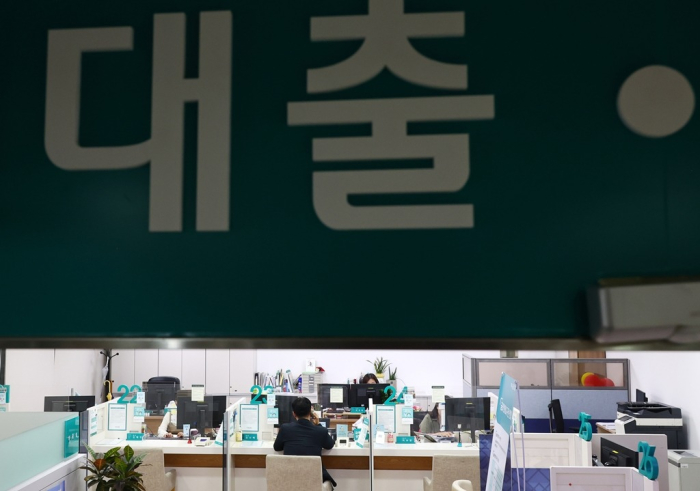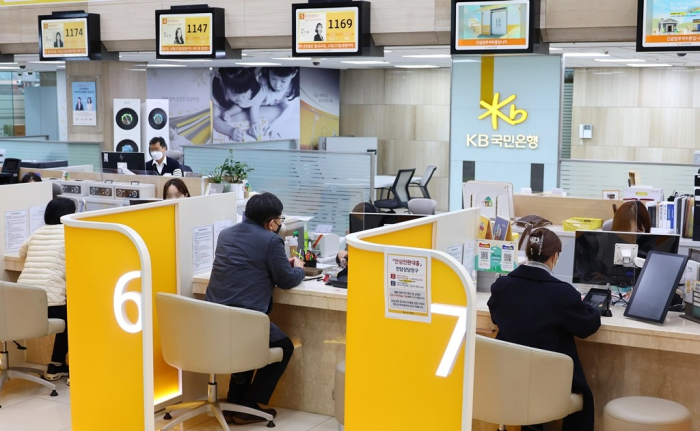Banking & Finance
Korean banks to cut corporate loans for profitability
Foreign shareholders may pressure lenders to cut corporate loans as its growth hurts shareholder return; delinquency rates up
By Jun 30, 2024 (Gmt+09:00)
5
Min read
Most Read
LG Chem to sell water filter business to Glenwood PE for $692 million


Kyobo Life poised to buy Japan’s SBI Group-owned savings bank


KT&G eyes overseas M&A after rejecting activist fund's offer


StockX in merger talks with Naver’s online reseller Kream


Mirae Asset to be named Korea Post’s core real estate fund operator



South Korea’s Hana Bank is set to reduce new corporate loans despite rising demand to improve profitability and soundness after having increased such lending by more than 40 trillion won ($28.9 billion) in the last three years, while its rivals are likely to join the move.
The lender of South Korea’s third-largest financial institution, Hana Financial Group decided not to provide corporate loans without profitability from July 1, industry sources said. The bank reportedly told branches not to offer loans with annual interest rates of below 5% to companies, according to the sources on Sunday.
Hana Bank’s profitability and soundness deteriorated as it aggressively ramped up corporate loans. Its balance of those loans totaled 167.8 trillion won as of the end of the first quarter, up 32.7% from the 126.4 trillion won at end-2021, the fastest growth among those of the country’s four largest lenders -- KB Kookmin Bank, Shinhan Bank, Hana and Woori Bank.
The competition in the domestic corporate loan market has been heating up since Woori and Shinhan actively expanded their presence in the sector with some lending with lower interest rates than funding costs.
“The increased corporate loans with rising interest rates is likely to raise banks’ provisions for loan losses and hurt their profitability,” the country’s central bank said in a recent report, calling for thorough management of each industry’s risks.
The average rate of delinquency, defaults of principal interest for more than a month, of corporate loans in the South Korean won currency already rose to 0.48% as of end-April, 0.11 percentage point higher than a year earlier, with the rate for small and medium-sized enterprises up 0.2 percentage point to 0.66%.
BLOODY COMPETITION
South Korea’s corporate loan market has been growing since non-financial companies have been scrambling for money from banks due to the fallout from a debt default by the local developer of a Legoland theme park in the country in October 2022. Lenders also focused on the sector as regulators took measures to cap household lending.
The balance of corporate leadership of local banks rose 21.2% to 1,291.6 trillion won as of end-May from 1,065.7 trillion won at end-2021 amid cutthroat competition in the banking industry.
“As corporate clients rushed to lenders that offered lower interest rates by even 0.01 percentage point, loans with negative spreads, which banks provided lower interest rates than funding costs, soared,” said a vice president of a major domestic lender in charge of its corporate and investment (CIB) banking business.
That dampened lenders’ profitability. Hana, which increased such loans during the period, reported 1.55% in net interest margin (NIM), a key gauge for a bank’s profitability, in the first quarter, lower than 1.68% a year earlier. The lender’s average interest rate of credit loans for small and medium-sized enterprises was 5.32%, the lowest among those of other banks.
SHAREHOLDERS MAY PRESSURE
The rising corporate loans ramped up risk-weighted assets (RWAs), banks’ assets or off-balance-sheet exposures weighted according to risk, forcing their common equity tier 1 (CET1) ratio to miss 13%, a threshold for allowing banks to return more to shareholders with dividends and other measures.
The ratio came under further pressure from the meltdown in Chinese shares listed on the Hong Kong bourse, which dented equity-linked securities (ELS) sold by South Korean banks tracking the Hang Seng China Enterprises Index (HSCEI).
Hana Financial Group’s CET1 ratio fell by 0.33 percentage point to 12.89% in the first quarter from the previous three months, while that of Woori Financial Group, the holding company of Woori Bank, eased by 0.04 percentage point to 11.95%.
Major financial holding companies asked their banking units to improve profitability, industry sources said.
“The industry needs to lower unsecured corporate loans, which raise RWAs, as foreign shareholders are concerned over the falling CET1 ratio, which usually affects shareholder return,” said a chief financial officer of a major financial holding company.
TO CUT CORPORATE LOANS
South Korean lenders, except KB Kookmin, are likely to slow down corporate loan growth.
Shinhan Bank reportedly plans to take a conservative stance in the corporate lending business in the second half as the unit of South Korea’s second-largest financial institution Shinhan Financial Group reported the largest increase of 6.3 trillion won in such loans in the January-March period among those of its rivals.
The lender provided loans to SK On Co., the world’s fifth-largest electric vehicle maker, and Shinsegae Engineering & Construction Co., the troubled building unit of South Korean retail giant Shinsegae Group.
Woori is also predicted to reduce new corporate loans as its holding company is set to acquire China’s Dajia Insurance Group Co.'s insurers in Korea for up to an estimated $2.2 billion, industry sources said.
“We aim to provide loans only to healthy companies in the second half to maintain profitability and soundness,” said a CIB executive at a local bank.

KB Kookmin may expand the corporate loan business as it has yet to join the competition due to the losses from the HSCEI-linked ELS, industry sources said. The unit of the top local financial institution KB Financial Group increased by 1.9 trillion won in such lending during the first quarter, the smallest among those of the four largest banks.
Write to Bo-Hyung Kim and Jae-Won Park at kph21c@hankyung.com
Jongwoo Cheon edited this article.
More to Read
-
 InsuranceWoori to buy Dajia’s insurers in Korea for up to $2.2 bn
InsuranceWoori to buy Dajia’s insurers in Korea for up to $2.2 bnJun 26, 2024 (Gmt+09:00)
3 Min read -
 EconomyKorea’s household debt growth at 5-month high on mortgages
EconomyKorea’s household debt growth at 5-month high on mortgagesMay 13, 2024 (Gmt+09:00)
2 Min read -

-
 Corporate bondsBOK to ease Legoland developer default-led credit crunch
Corporate bondsBOK to ease Legoland developer default-led credit crunchOct 28, 2022 (Gmt+09:00)
2 Min read -
 Corporate bondsKorea's $35 bn plan yet to ease Legoland default woes
Corporate bondsKorea's $35 bn plan yet to ease Legoland default woesOct 25, 2022 (Gmt+09:00)
4 Min read
Comment 0
LOG IN


